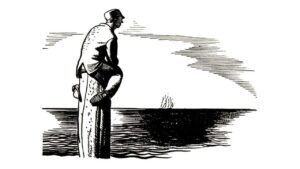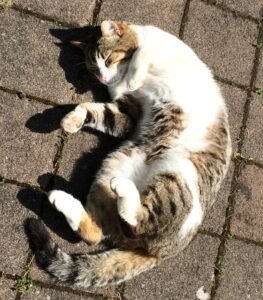 This week I had planned for “portent,” but I see that I covered that term in 2020, just before the last national election. I guess like many of you I’m concerned, looking for portents. Whatever this year’s outcome, there are storm-clouds looming on the national horizon.
This week I had planned for “portent,” but I see that I covered that term in 2020, just before the last national election. I guess like many of you I’m concerned, looking for portents. Whatever this year’s outcome, there are storm-clouds looming on the national horizon.
As a verb, our word traces its first recorded use to the 17th Century. Its etymology remains unclear, with The OED fact-sheet noting that it might be of Germanic origin. I enjoy words like that; in fact, it suits the mysterious sense of our word quite well.
We might use “loom” today to mean to tower over, threateningly, someone or something. While that usage retains a great deal of power, the word can also mean to appear indistinctly in the distance, the way a storm cloud might an hour or so before we run for cover. Depending upon the situation, we might employ “tower over” or “threaten” as synonyms.
Here’s a curious note: usage of our word enjoyed a steady rise in use since it appeared. Usage peaked about 1930, which by mid-decade Churchill called “The Locust Years”: these years were replete with looming troubles. Postwar, frequency of “looming” declined, bottoming out about 1990 and the beginning to increase. Do journalists like the word enough to put it back into circulation? Or do events of large consequence: political dysfunction, climate change, looming trillionaires, artificial intelligence, and pandemic drive the rise?
We all have a front-row seat, like Rockwell Kent’s landlubber on the dock from the illustration.
Whatever happens in a week, I wish you all well. Right now, it seems to me that small gestures of civility and open inquiry matter more than ever. It is a melodramatic thing to say to young people, but I remind my students every semester that I see our modern university system as a shield against a New Dark Age. Perhaps the shield has gotten battered by all the slurs hurled against higher education, but it remains one of the only shields I trust.
So if you have word or metaphor that might serve well in this season of loomings, send them to me at jessid -at- richmond -dot- edu or by leaving a comment below.
See all of our Metaphors of the Month here and Words of the Week here.
Image: Rockwell Kent, “Loomings” from the first chapter of Melville’s Moby Dick.


